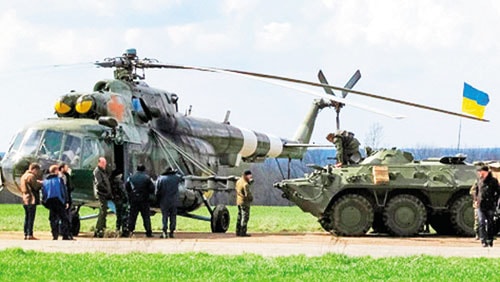Civil war or federalization: What is the future of Ukraine?
(Baonghean) - Last week, the situation in Ukraine continued to be a hot spot of world public opinion with a series of new developments. Analysts said that the Ukraine crisis has entered a new phase that is considered crucial, with many unpredictable risks. Faced with warnings of a possible civil war, public opinion is looking forward to the first direct four-way dialogue between Russia, Ukraine, the United States and the European Union taking place today (April 17) in Geneva, Switzerland. In addition, the solution of a federal state has also been mentioned to resolve the current Ukraine crisis. So what will be the future of Ukraine at this time?
 |
| Ukrainian helicopters and armored vehicles deployed in the town of Izium, eastern Ukraine. (Photo: Reuters) |
The impotence of Ukraine's interim government and the risk of civil war
Since last weekend, violent protests occupying government buildings have broken out in the eastern provinces of Donetsk, Kharkov, and Luhansk. In particular, the protesters in the Donetsk region have declared independence and established a "people's republic". In this situation, the interim government in Ukraine has issued a series of ultimatums. The first ultimatum was issued by the Ukrainian Ministry of Internal Affairs on the evening of April 10, with a two-day deadline for protesters to choose between dialogue or force. The second ultimatum was issued by the acting President of Ukraine on April 13, with the demand that protesters lay down their weapons by the morning of April 14 or face a "full-scale anti-terrorist operation".
However, both deadlines for the ultimatums have passed without any action in the eastern regions. In response, the interim Ukrainian government has announced a campaign to suppress protesters. By April 15, Ukraine had mobilized a large number of soldiers and armored vehicles to retake a military base in the city of Kramatorsk. Meanwhile, according to AFP, at least three unmarked armored vehicles with Russian flags appeared in the town of Kramatorsk on April 16. Observers say these developments not only escalate the situation but also increase the risk of a civil war in Ukraine.
Russia appeases, America and Europestill tense
While the protests in Ukraine are complicated, Russia has made many diplomatic moves and statements to calm the situation. In a phone call with German Chancellor Angela Merkel on April 15, Russian President Vladimir Putin expressed hope that today's negotiations in Geneva could help calm the situation. Earlier this weekend, Russian Foreign Minister Sergei Lavrov affirmed that Russia has no desire to annex any eastern regions of Ukraine, because this is contrary to Russia's fundamental interests. Russian President Vladimir Putin also eased Western concerns regarding cutting off gas supplies to Europe.
However, despite Russia's moves to ease tensions, the US government has continued to announce a list of additional sanctions targeting six Crimean leaders. The US State Department also said on April 15 that there may be additional sanctions against Russia in the near future related to the crisis in Ukraine. As for the European Union, on April 14, EU foreign ministers also decided to impose additional sanctions against Russia such as freezing assets or banning travel for a number of Russian officials and citizens related to the current crisis in Ukraine.
Diplomatic solutions and a federal state solution?
At this time, although there are still many conflicts and difficulties between the relevant powers, international diplomatic efforts are being promoted to reduce tensions in Ukraine. On April 15, UN Secretary General Ban Ki-moon had a phone call with Russian President Putin, expressing concern about the increasing tension here. Mr. Ban Ki-moon also rejected the proposal of the interim government in Ukraine to deploy UN peacekeeping forces, because he thought that the current time was not appropriate. This will certainly also be a main content that the parties will bargain for in the 4-party direct dialogue taking place today. However, although there is special hope, this dialogue, if favorable, will only open up a further diplomatic solution. Because with Ukraine's special geopolitical position and geostrategic interests, it is difficult for the powers to reach an agreement to resolve the crisis here overnight.
Meanwhile, another solution that can resolve the Ukraine crisis that has been mentioned recently is the federalization model proposed by Russia. Notably, on April 14, Acting President Turchynov affirmed that the government does not oppose a referendum on the issue of federalization, and it can be held together with the presidential election on May 25. However, according to analysts, this may just be an "empty promise" of the interim Ukrainian government. Because the Kiev government fears that if a federal state is established, it is very likely that some newly established countries will make the trend of wanting to annex Russia stronger in the eastern regions. However, according to Russia, a federal Ukraine is a good solution. Because Russia believes that this model is suitable for the needs and aspirations of the Ukrainian people, because it will give different regions of the country more autonomy in many areas.
However, no matter what solution or model it is, the current government in Kiev must consider the pros and cons, as the internal conflict between the East and the West continues to deepen along with the reality of the country being hungry and stagnant. Meanwhile, the delay in financial aid plans from the US and Europe is showing a lack of "sincerity" towards Ukraine. Thus, a stable future for Ukraine depends on a plan that reconciles the interests of both the East and the West, not on the government's ultimatums to suppress the current situation. Otherwise, the scenario of division and internal conflict will not stop in this Eastern European country.
Phuong Hoa






